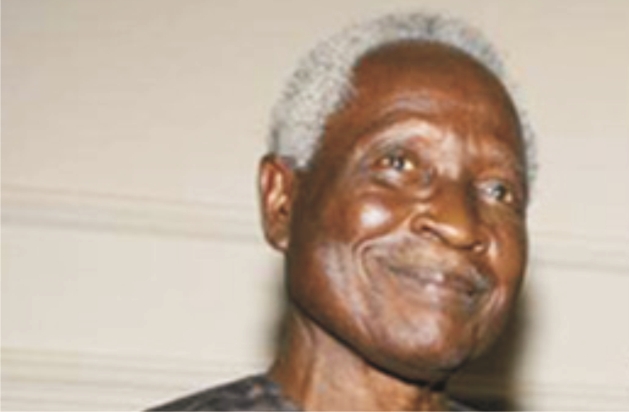Opinion
Elechi Amadi: Tribute To A Literary Icon

With tears drifting down my cheeks, I join the
entire Nigeria and Rivers State in particular to mourn the passage of a literary icon and wordsmith, Dr Elechi Amadi. He died on Wednesday, June 29, 2016 at the age of 82 years.
Dr Amadi was my literary father and role model. He was an African literary giant who through his works impacted positively on the entire world.
In the gathering of Nigerian literary icons, Dr Elechi Amadi had his seat in the front rolls with the literary legends like late Prof. Chinua Achebe, Prof. Wole Soyinka, Prof. J.P Clark, Prof. Chukwuemeka Ike, among others.
He was a novelist, playwriter, essayist and poet. His literary works are numerous and exemplary including The Concubine (1966), The Great Ponds (1969), Sunset in Biafra (1973), The Slave (1978), Estrangement (1986), Isiburu (1973), The Road to Ibadan (1974), Pepper Soup (1977), Dancer of Johannesburg (1978), The Woman of Calabar (2002), Ethics in Nigerian Culture (1982) and Speaking and Dancing (2003). His first book of science fiction ‘When God Came’ was published in 2011.
These works made positive impact beyond Nigeria and Africa. The Concubine for example, was translated into many languages and received international ovations and accolades.
Late Amadi was a man of many parts, a man of impeccable character, a man of wisdom, a man of integrity and hardwork. He was a lecturer, a soldier, writer, community leader, permanent secretary, commissioner and chairman of boards of parastatals. Yet, you cannot notice any aura of affluence in him. He was a great man in all spheres.
Born in Mbodo, Aluu in Ikwerre Local Government Area of Rivers State on May 12th, 1934, the late literary icon attended Government College, Umuahia in the present day Abia State. He also attended School of Surveyor, Oyo State and later enrolled into the University College, Ibadan where he obtained a degree in Physics and Mathematics.
Dr Amadi was appointed Permanent Secretary by the Rivers State Government and served in several ministries from 1973-1983. He voluntarily retired and picked up an appointment with the Rivers State College of Education, now Ignatius Ajuru University of Education as a lecturer. He was the Dean of Arts, Head of the Literature departmentand Director of General Studies. He was also a writer-in-residence at the University of Port Harcourt.
He was appointed Commissioner for Education from 1987 to 1988 and later Commissioner for Land and Housing from 1989 to 1990. He was also appointed Chairman of Rivers State Scholarship Board in the immediate past administration. Dr Elechi Amadi was elected President General of Ogbakor Ikwerre Cultural Oganisation Worlwide and thus became the 10th Ochi Oha Ikwerre (the 10th ruler of Ikwerre people).
He was the founder of Elechi Amadi School of Creative Writing at the CAS, Rumuola, Port Harcourt. An incorruptible man he was, he discharged these enormous responsibilities without blemish.
He was kidnapped at his residence in Aluu on January 5, 2009, but was miraculously released a day after without paying any ransom.
Dr Amadi had so much preference for writing more than any other profession. When asked to choose between being a soldier and a writer, Captain Amadi said without mincing words that he preferred to be a writer than a soldier.
Dr Elechi Amadi was a recipient of many honourary doctorate degrees from many universities. He was also awarded the Rivers State Silver Jubilee Merit Award and Fellow of the Nigerian Academy of Education. He was honoured by the Federal Government of Nigeria as Member of the Order of the Federal Republic (MFR) for his outstanding contributions to the growth of literature in Nigeria and Africa. Though Elechi Amadi is dead, his works live after him.
By his death, Ikwerre nation, Rivers State and Nigeria have lost an incorruptible mind, a fighter for social justice, a prolific writer and a renowned author. His death was indeed a sunset in Nigeria and the literary world. We will miss him greatly. May his soul rest in peace.
I pray that the Rivers State Government will liaise with his family to accord him a burial befitting a man of his status.
Ogbuehi wrote in from Oduoha-Emohua, Rivers State.
Ikechim Ogbuehi
Opinion
Righteous Leadership Still Thrives

Opinion
Incentives: Key to Police Morale

Opinion
Time and Season Can Tell

-
City Crime5 days ago
NCSU Hails Fubara Over 2025 New Telegraph Man Of The Year Award
-
Nation5 days ago
Nigeria Risks Drifting Without Strong Education Policies-Don
-
Nation5 days ago
Ex-UNIPORT SUG Leaders Organise Symposium In Honour Of VC
-
Nation5 days ago
Council Chairman Reconstitutes Revenue, Anti-Illegal Trading Committees To Boost IGR
-

 Education4 days ago
Education4 days agoElga boss tasks law students on academics strides
-

 News1 day ago
News1 day agoAmend Constitution To Accommodate State Police, Tinubu Tells Senators
-

 Politics1 day ago
Politics1 day agoSenate Urges Tinubu To Sack CAC Boss
-
Business1 day ago
President Tinubu Extends Raw Shea Nuts Export Ban To 2027

